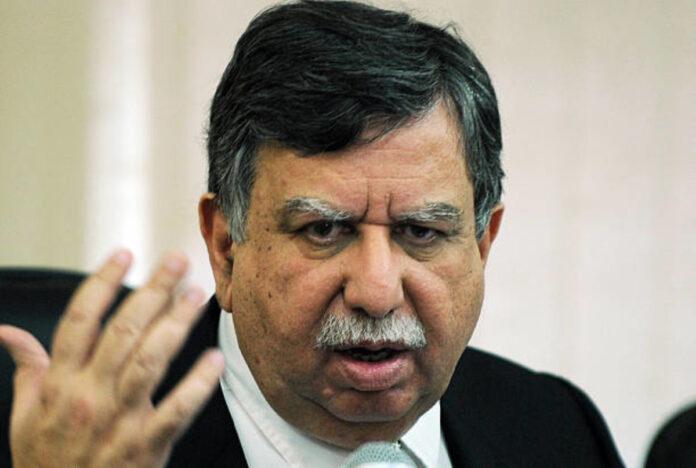ISLAMABAD: Federal Minister for Finance Shaukat Tarin has said that the Pakistan Tehreek Insaf (PTI) government on the recommendations of the Economic Advisory Board (EAB) has prepared a comprehensive plan to achieve inclusive and sustainable growth.
He along with the other ministers as well as members of the Economic Advisory Council (EAC) explained to the media about the short-term and long-term plans prepared by the verticals of EAC.
The finance minister (FM) commented that economic ministries were working without any proper planning since 1972 so the PTI government had formed a high-level EAC and added the private sector officials in different groups.
He also said that the Pakistan Institute of Development Economics (PIDE) will help the EAC groups to implement the recommendations furnished by these verticals. “The groups will brief Prime Minister (PM) Imran Khan every month about the implementation of the plan,” he announced.
Tarin further added that positive sentiments were coming from overseas chambers as well as the business community. “Pakistan textile exports grew by 16 per cent and Pakistan has also started manufacturing mobile phones which is a good omen for the country,” he said.
Minister for Industries and Production Khusro Bukhtiyar said that Covid-19 hit Pakistan’s manufacturing sector badly. However, large scale manufacturing (LSM) grew by 15 per cent due to prudent policies of the government including industrial support packages, relief and incentives to export-oriented industries, duty exemption under China-Pak Free Trade Agreement-II and electricity and gas subsidies.
The minister further said that the government had also announced various policies such as auto, Small and Medium Enterprises (SME) and mobile device manufacturing policies and these had not only generated income but also employment.
The minister explained that 236,664 automobiles were sold in 2020-21 while production in 2021-22 will cross 300,000.
He also said that the government will promote and develop the allied sectors of large-scale manufacturing under the SME policy. In addition, the ministry has not only simplified the regulatory regime but has also announced certain tax incentives in the recent budget.
Under the mobile device manufacturing policy, Pakistan is now manufacturing mobile phones. Domestic production was 12.27 million (including 5,500 exported) from January to July 2021 whereas 8.29 million cellphones were imported.
He also announced that M/s Samsung will start local manufacturing shortly. “The government will now focus on the expansion of production capacity in these sectors to meet expanding requirements,” Tarin added.
He further revealed that the government was going to establish a Karachi Industrial Park on 1,500 acres of Pakistan Steel Mill land which will cost around Rs7 billion. The project will further augment the mercantile potential of Karachi.
Minister for National Food Security Fakhar Imam said that new initiatives are being launched to strengthen the agriculture sector.
He informed that the country witnessed a significant increase in major crops. He mentioned that the focus was now on improving cotton production by providing quality seeds and other inputs to the farmers at reduced rates.
Imam said that the research institutes will be upgraded to achieve high productivity in the agriculture sector. Furthermore, the government was giving special emphasis to improve the living standards of the farmers. For this purpose, the government had increased the support price of wheat from Rs1,400 per 40 kilograms to Rs1,800 per 40 kilograms.
“Efforts are also afoot to upgrade the livestock sector,” he said.
Moreover, Adviser on Commerce and Board of Investment Abdul Razak Dawood said that the government’s target was to bolster exports. He claimed that the export targets were being achieved.
Dawood added that the government wanted to rationalise imports by encouraging local production and expressed satisfaction over the local manufacturing of mobile phones. He said that the government had rationalised tariff and 50 per cent of the raw material being imported was duty-free.
He mentioned that this facility will be further expanded in the next budget.
Dr Ishrat Hussain also emphasised the need for empowering the local bodies to provide basic amenities to the people at their doorsteps. “A plan has been prepared to revamp the state-owned enterprises,” he added.
Members of the EAC, Arif Habib and Muhammad Ali Tabba, commended the government’s pro-business policies.
Tabba said that more people were showing interest in manufacturing as a result of the government’s policies. He was confident that the government will surpass the growth target set for the current fiscal year.
Habib was appreciative of the government’s construction package and the housing scheme.
While answering a question, Tarin ruled out the possibility of coming out of the International Monetary Fund (IMF) programme.
“Our negotiations with the IMF are going on and I will also visit Washington in October for one-on-one talks with the international lender,” he added.
Answering another question, he said that he could not comment on the last three years’ performance but could share the details of work done during his tenure. “Our intent is noble, and we have prepared these plans to put the economy on a growth trajectory and I am also ready to sit with the opposition parties on finalising the character of the economy,” Tarin added.




